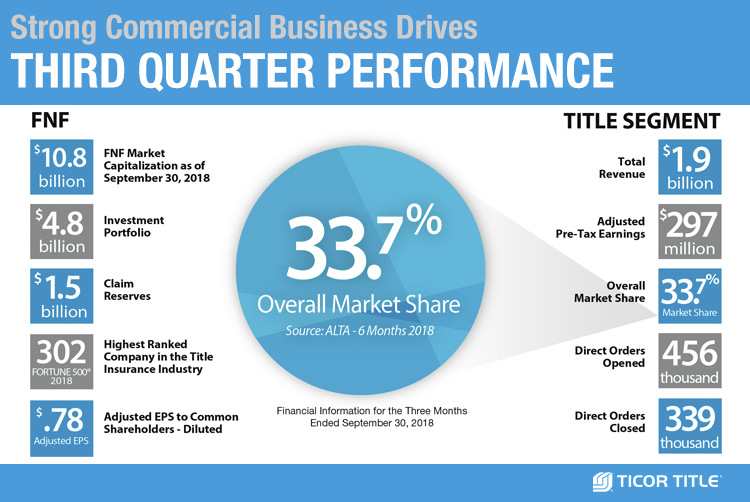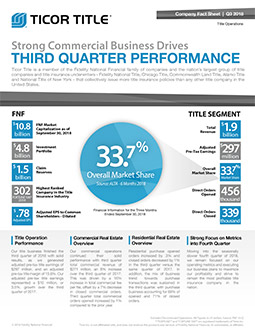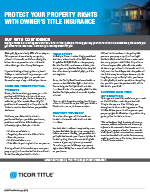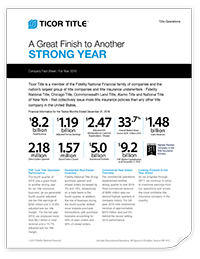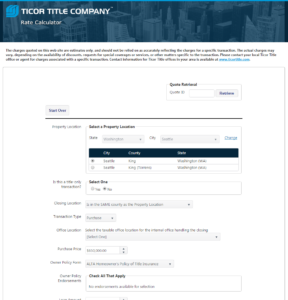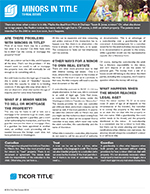
There are times when a minor is in title. Maybe the deed from Mom & Dad says “Susan B. Jones, a minor.” Or, when she shows up to sign papers, the Realtor® notices the nanny who brought her in. Of course, a child can inherit property. The parents never intended for the child to own it so soon, but it happens.
Are there problems with minors in title?
Custodian
Washington has adopted the Uniform Transfers to Minors Act. This is the most practical way for minors to “own” property. There is no document or agreement. The statute deals with the responsibility of the custodian to the child. Otherwise, you can have a…
Trust
A trust can be set up for a minor, either separately or by language in a will. The trustee can also transfer property to a custodian (who can even be the trustee) if the trust permits it. But if there is no trust or custodianship, you need a…
Guardian
A guardianship is often what happens when both parents are deceased without making provisions for how a minor child can deal with property. It’s not absolutely necessary unless real property must be sold or mortgaged, but a court must approve any real estate transaction.
Most of us know there may be a problem, but what is it, exactly? Can little Suzie even be in title? Can she convey or mortgage the property? How?
Well, yes a minor can be in title, and it happens all the time. That’s not the problem – if she doesn’t want (or need) to sell or mortgage the property now, she will eventually be old enough to do something with it.
But until Suzie reaches the legal age of majority, she is under a type of “disability” because she lacks the capacity to enter in to binding contracts. If she signs title away when she is 17, she can disavow it when she reaches the age of majority and for some time thereafter.
What if a minor needs to sell or mortgage the property?
The only way for Suzie to sell or take out a mortgage is for someone to go to court, open a guardianship, appoint a guardian, get a court order authorizing the transaction, and have the guardian execute the deed or mortgage. Also, if a guardian has been appointed in another state, an ancillary court proceeding will be needed because the foreign court does not have jurisdiction in Washington.
All this can be expensive and time consuming and pretty onerous if the transaction has to happen now. But, there is no alternative – the horse is already out of the barn, so to speak. The conveyance to Suzie (or her inheritance) can’t be undone.
Other ways for a minor to own real estate
There are other more practical ways to deal with children owning real estate. One is a trust, where title is conveyed to the trustee of the trust, or the trust is set up in a probate. In that case, the title company will need to see the trust document or the will.
A custodianship pursuant to RCW 11.114 is a simple alternative. In that case, title is conveyed to an adult of legal age: “John Paul Jones, as custodian for Susan B. Jones, under the Washington Uniform Transfers to Minors Act.” The statute provides for only one custodian per child per deed, and a trust company can be named as well, if the trust permits it. It used to be called the Uniform Gifts to Minors Act, and you might see this recital in a deed coming from another state. A deed can be accepted from a custodian in any state, which need only recite the adult custodian, the custodianship and the name of the minor.
When title is vested in a custodian, title insurers do not need to call for any proof of authority or documentation. This is an advantage of a custodianship over a guardianship for all concerned. Acknowledgments for a custodian would be for the adult individual, because there is no documentation to present to the notary, while a guardian would use the representative capacity (for a fiduciary) form.
Of course, during the custodianship the adult has a fiduciary responsibility to the minor, and can’t dispose of or use the assets for personal gain. The money from a sale of a house would still belong to the minor. But third parties, including title companies, don’t need to question where the money will end up.
What happens when the minor reaches legal age?
Once the minor reaches 18, 21 or in some cases 25 years of age (it all depends on the circumstances of the transfer), the custodian is to convey the property to the minor. But as an adult she can deal with the property in her own name. With a guardianship, the court action needs to be closed, and the property distributed to the minor. A custodianship is a convenient way for a minor to hold title, but there can be estate planning and taxation ramifications when children own real estate. An attorney should always be consulted if a minor is or will be in title.
Questions or comments? Please share below!
